Russian Olive to Red King
Created by: Kathryn Immonen and Stuart Immonen
Published by: PUBLISHER
ISBN: 1935233343 Amazon
Pages: 176



Experimentation, for the artist, is always a risk. The risk isn't in failure, because art is always going to appeal or not appeal according more to whim of critics and the public than to the objective quality of the work (in the hypothetical world where such a quality even could exist). The risk isn't in the artist not achieving the heights of creative majesty hoped, because that's always at stake whether the artist experiments or not. There might be some financial risk involved, but really any artist who wagers the month's rent on an experimental work is gambling blindly anyway. For my money, the most visceral and real and unblanching risk is that one's audience might think it's all a put-on.
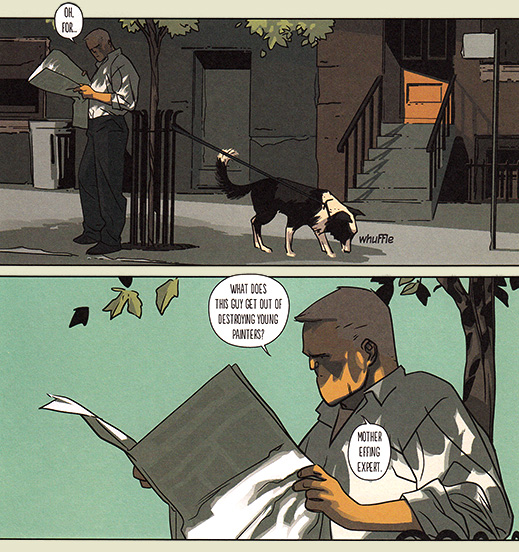
The trouble with experimentation is that it feels so contrived precisely because it is contrived. Any work that sets out to experiment is one that is by its nature very conscious of how it bends and twists and tweaks and fragments and remolds what is expected. The artist knows what works and what the audience will see coming and consciously does something else in order to surprise or reinvent. The risk is that an audience will not see the experiment as legitimate—that it will be regarded as the artist just being Artsy, as being different wholly for the sake of being different. And so, the biggest risk in experimentation is that the established artist, the artist that an audience has come to rely upon, will suffer a blow to the reputation. If the experiment fails, the artist (depending on the depths of the failure) can no longer be trusted.11For a cinematic example, refer to M. Night Shyamalan. With Sixth Sense and Unbreakable, he established himself as a director of note. And while The Village and Signs each had their detractors, both films were solid and had some great things going for them. Then he experimented with The Lady in Water, which most viewers didn't get, didn't like, or just didn't cotton to. Some people just chalked it up to a good director having a misfire. "Sure, he had grown a bit self-indulgent, but he'll bounce back." Then came The Happening and suddenly his name was a joke and the butt of jokes. His name won't draw crowds anymore because his experiments were regarded as the artist being too much in love with himself and imagining that he could weave gold out of straw.
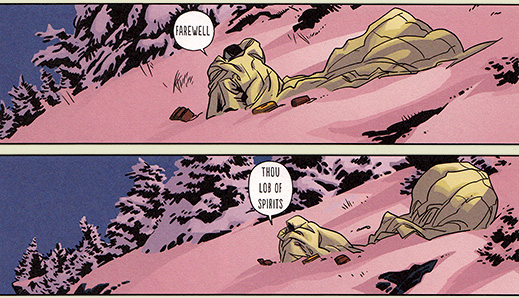
The trick for the artist, then, is somehow to prevent the viewer from believing that there is a trick going on. When viewers believe they are being snowed, antipathy toward the work and then toward the artist begins to foster. The artist must distract the viewer then—either by wowing through the sheer audacity of the height of experimentation, inviting the viewer to take part in the experiment, or by doing such a great and good job that it doesn't feel like experimentation at all. There is a third path—and a riskier path, I think. The artist creates a mild experiment, something outside of the established format, and rather than distracting from the experiment or wholeheartedly inviting the viewer to revel in the experiment, the artist tries to justify the new idea within the space created by the idea.
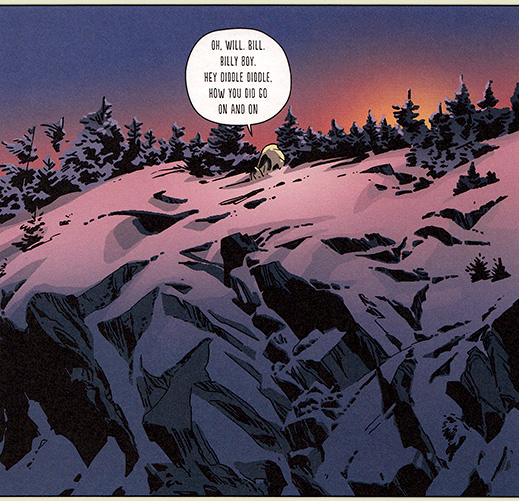
This is the path the Immonens take with Russian Olive to Red King, and I'm a bit on the fence with regard to how successful they are. At first blush, the whole thing feels like a bit of a put-on. Maybe not as bad as Anders Nilson's Monologues for the Coming Plague, but still a bit too self-consciously artsy. But then, after the reader settles down and stops being disappointed that the story couldn't have unfolded through common, typical forms, little things tend to drop into place. Details here and there. And Maybe, the reader might feel, Maybe this was a success. Not a wild and unrelenting success (I can see many readers remaining unconvinced and frustrated by the book), but just maybe it really does all pull together.
As I said, I'm a bit torn on that matter. But ultimately I lean toward the conceit working. Even though I would have preferred a more conventional exploration in that final experimental section. In a moment, I'll be speaking explicitly about the book's details, so if you've not yet read the book, you may want to leave off there.
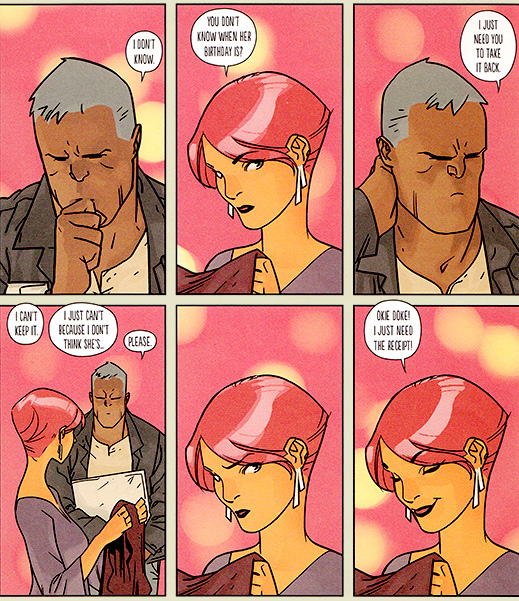
The only remaining thing I'll say about the book generally is that during the half of the book when Stuart Immonen is drawing, I believe this is the best work I've seen from him since Moving Pictures. He's an artist whose evolution of line I don't believe I'll ever tire of.
And now, three petty negatives before I get to why I think Russian Olive to Red King is good and worthwhile and actually really does work and isn't a put-on at all. The book could have used a bit more attention in the proofing stage. There are a couple typos that got through. A missing word here, a misplaced apostrophe there. For a book printed and packaged in such a lovely fashion, it's too bad that those little things got through.
 sh'es
sh'es
On a note of personal taste, I had difficulty focusing on the essay section in the end largely because the sans serif font used there was not conducive to reading. Visually, I found it alienating precisely as I believe it was meant to retain my interest. It's the most human aspect of the book and would have, I think, benefited tremendously from being printed in a serifed type—much like every novel on the market. There's a reason why literature is not published in sans serif. It's just too difficult on readers and such is the case here. Or at least was for me.
And finally, the book begins with the couple, Olive and Red, in bed with Olive waking and dressing while Red sleeps. Olive does this thing that they do in movies and television where the actress sits up in bed and covers her chest with the blankets. It makes sense in the fairytale worlds of tv and movies where an actress is altogether aware that her actions and state have an audience and she isn't willing to give a free show for the sake of anything so trite as verisimilitude. But I do not believe in the woman who sleeps naked in bed with a husband or boyfriend but expresses a strange sense of prudish modesty when no one is looking. As well, the language used indicates this is a book for mature readers, so that doesn't seem to be the reason Olive consciously covers up. It's possible that this is meant to give the readers the sense that she suffers from some kind of psychological issues, but they aren't revisited so I'm not sure that's the reason for it. And I'm not even asking that the book have nude women in it—with the art's minimal flair, it would be easy to simply not draw in the details or make artful use of shadow. I simply found the incomprehensibility of the act stripped me from involvement in the story while I tried to understand a reason for it. Again, probably petty of me.
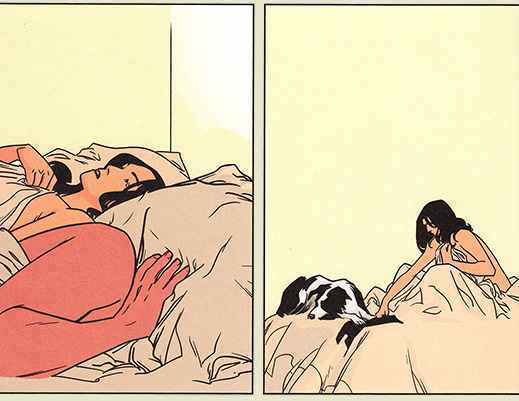 Would this ever happen? No, it would not.
Would this ever happen? No, it would not.
Okay, so what about why I think the book works? Let's start with a summary of what actually happens.
After a prologue in which we learn that Olive is going away for a work trip, the main story of the book takes place across seven days, each marked by the chapters Roman-ennumerated I–VII. At the end of the first day, Olive's plane crashes.
From this point onward, it's uncertain whether she's alive or dead. Both for Red and for the reader. I suspect that she is actually dead for the remainder of the story and that the Olive we see across those seven days is her ghost, still clinging and hanging on to this life.
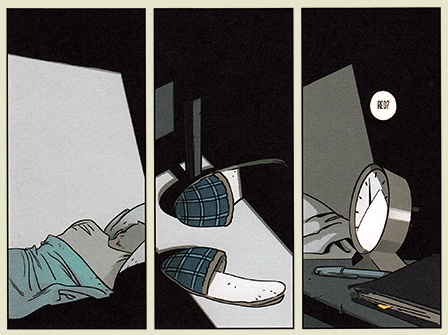
The foremost reason to believe her already dead is the visitation to Red's apartment in the early hours of Day II. We see Red's slippers haphazardly resting by his nightstand, while a voice calls, "Red?" We see Olive's shadow cast through the moonlight. Then Red's slippers are more neatly arranged and Red wakes saying, "Olive?" Simultaneously enough, Olive wakes in the wreckage. That's the big clue, the physical alteration of Red's environment during the Olive visitation (or alternatively, during Red's dream of Olive's visitation).
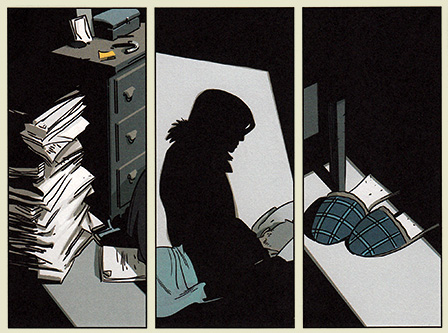
Additional clues to Olive's demise in the crash emerge as the story unveils. Olive wakes with no injury and no pain. She has been unconscious for nearly a full day. The plane crashed not far after sunup on Day I and she wakes near sunup on Day II. Never mind sleeping in a plane with no working heater in the snow for a full day and night. An impact that would leave someone unconscious for nearly twenty-four hours is serious enough that there would almost unquestionably be residual pain and soreness, yet Olive is particular in remarking about the absence of any injury at all.
Further, the environment seems magically to have no real effect on her. Stuart Immonen mentions this in an interview. Olive doesn't sink into the snow like she should and the taiga poses no real obstacle for her travel. And maybe that's just the magic of storytelling, but it's also one more evidence toward reading Olive as already dead.
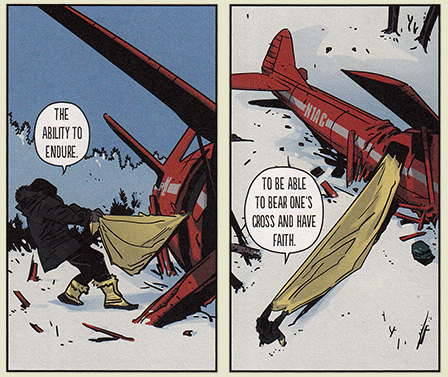
With this reading, her actions then seem more interesting, I think. She begins Day II by gathering to herself every earthly thing she can (while quoting Chekhov's actress Nina speaking about the value of acting). Things she will never need, like a USB cable, lots of keys, lots of pens. She drags it all along in a parachute—a means of preserving one's life—but eventually across the days that follow, haphazardly leaves things behind. She's letting go. Even of things that would help her stay warm, if she truly needed to stay warm. On Day IV she leaves behind a red sweater (on Day V Red returns to a store a red sweater that he'd bought for Olive). Finally, she gives up and burns her last ties to this life. Not only is she letting go but she is ready to let go. And ready to stop being lost. She crawls into the dark womb of the cave and from her fetal rest she returns to Red, standing in the street before his apartment, watching for him. She has fulfilled her promise to return, though not in any way that he can apprehend.
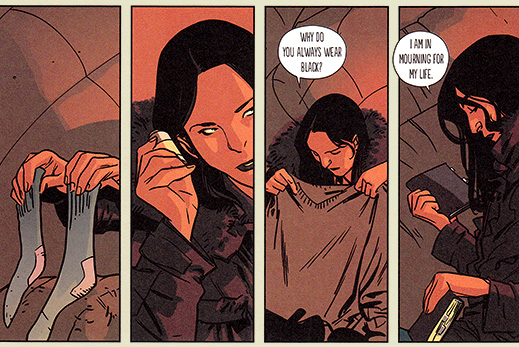
There are two ways in which I understand the title, Russian Olive to Red King, and this is one of them. Olive moving literally, spiritually to—toward—Red. Her half of the story is a story of journey, of return. She's the dogs and cat in Homeward Bound—she's got her own incredible journey to make and she's plenty talkative despite the solitude. And it may have actually been hope that tied her to her spectral earthly travel. She is given a week to return—a week is the longest Red can hold out hope. In the late hours of Day VI, Red has finally given up (though he is still plaintive). He knows Day VII will arrive too soon with no word. And with the evaporation of Red's hope, Olive burns her parachute and underscores the truth: "I'm already gone."
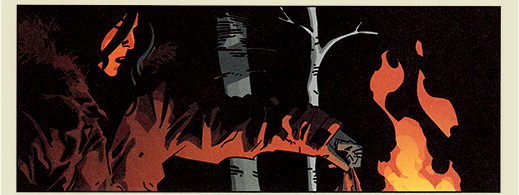
And on the seventh day, rest.
Red, for his part, is also lost. Only he's been lost a lot longer. The reason for his distance from the human condition, for his aloof irresponsibility, is a mystery. He's generally perceived as impenetrable and perhaps unlikable, though Olive seems to value him enough to promise a return. While Olive has to dress in black in order to affect a sense that she is mourning for her life, Red needs no exterior cues. It's simply presumed by his demeanor.
And now he has one more thing to mourn. One more tragedy on top of the mess that his life already was. But he has one more thing to tell Olive. After she abolishes herself within that cave and stands silent for the remainder of the volume, Red tells Olive this final thing. Olive, through her journey back to Red, whether real or imagined, has given Red a gift. She has loosed the dam on his imagination, letting his writing gush over the block that had him stoppered and unproductive. The title's second meaning: Olive's gift to Red.
And so we get VIII: For Olive. I read this as Red finally producing the essay his editor had been calling about, an essay in the creative non-fictional vein dedicated to Olive. Explaining to her the things he needed her to hear. The things that might have kept her from abandoning him had she known.
The mind of the bereft. The one who is left grasps and believes that had their true self been known, their former companion, comrade, lover, spouse, friend, conspirator would have remained. Either from pity or from understanding. To the abandoned, the reason will hardly matter.
Red begins by explaining that in what will follow, the reader will not find a satisfactory explanation. Because though we deserve one, that's really more than we can expect. Likely because our interlocutors too often find themselves unable to come right out with the truths that govern their lives—largely because they have yet to discover themselves, I suspect. And if a person hasn't yet found out the truths that make up the person whom they really really are, then how can we expect them to be able to succinctly explain themselves? And so we have Red, talking entirely about who he is by talking about everything other than who he is. Despite his reluctance to understand how metaphor relates to truth, he embraces it as if a life preserver.
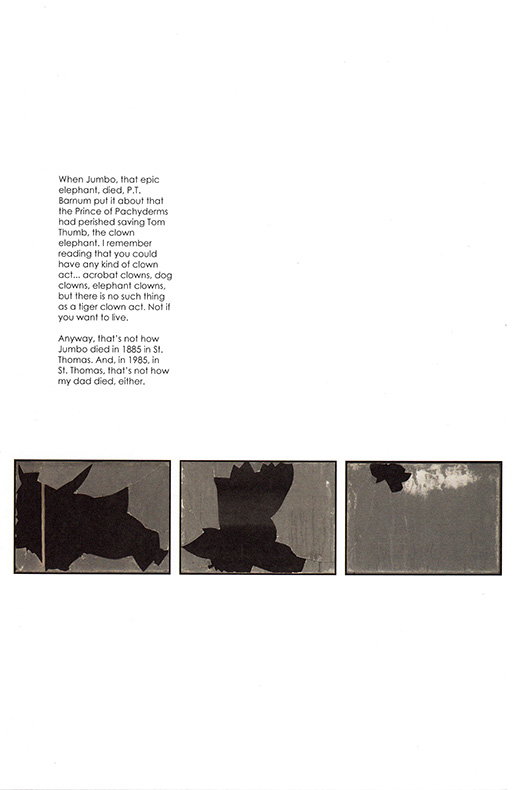
And so, in the manner of the contemporary essay writer, Red elides by cascading through a cacophony of pictures, all meant to unveil himself to she who has ears to hear. (Even if from beyond the grave.) Obituaries, train tracks (both the model kind and the elephant-killing kind), motels, bars, a series of revised confessions, a missing father, missing shoes, an over-talking friend, and an elephant that died over a century ago. They all relate and they all reveal, but never in a way that can satisfy. Certainly not for the voyeur who's merely glanced in on seven days of Red's out-of-context life, and probably not even for Olive, who was in some sense dying to hear this testimony.
We end with Red remembering an admission that he remembered (at one point) that (at one point) he loved to draw. We're left with Red exercising the creative self (through writing an essay) and expressing creative ambition (remembering that he loves to draw, to create). Only then we turn the page. We turn the page after Red's creative deluge, and find the entire time he's been working an act of destruction, shattering windows. An image of conflict. Compounded by his active care for Olive's dog, Pasha, a pet he was previously reluctant to care for.
It's a workable conclusion in that it doesn't take easy ways out. It doesn't play to formulas or explanations. It feels a little hand-holdy in that Red straight up warns us not to hope for a tidy bow on things, but writers like Red often forget that the rest of us actually do know how real life works, so that feels right as well.
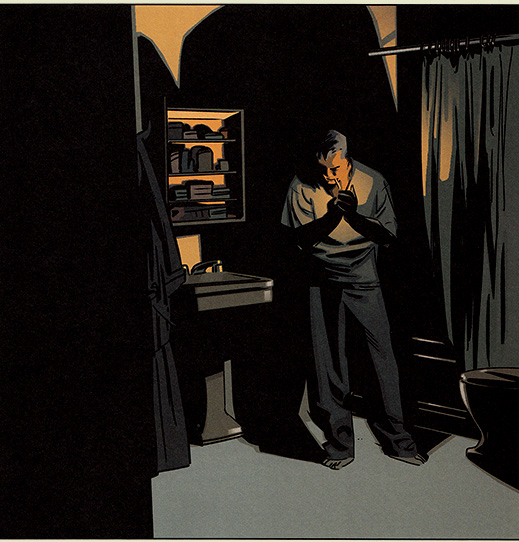
If we're talking about preference, then yes: I would have unquestionably preferred Russian Olive to Red King to have explored its Chapter VIII through a creative use of the comics medium rather than the text-heavy photo-embellished essay the Immonens chose to enlist. I can think of several neat ways they might have accomplished something similar to what they went for. Similar, but not the same. Because the direction they did employ levels Red's essay as a brutal betrayal of expectation. And it might be that the jarring effect of the book's abrupt reorientation pushes the reader to re-evaluate Red because maybe we wouldn't have been able to get that sense of him in any other way. Maybe.
I expect this will be a divisive book. Pretentious or artful? Successful experimentation or self-conscious folderol? I lean toward worthwhile—not an unmitigated success, but a much more measured victory (and one that breaks my heart because I'm prone to having my heart broken). But even its worst detractors would probably have to admit, Russian Olive to Red King makes for a peach book club discussion. It may have even been built for that.
Good Ok Bad features reviews of comics, graphic novels, manga, et cetera using a rare and auspicious three-star rating system. Point systems are notoriously fiddly, so here it's been pared down to three simple possibilities:
3 Stars = Good
2 Stars = Ok
1 Star = Bad
I am Seth T. Hahne and these are my reviews.
Browse Reviews By
Other Features
- Best Books of the Year:
- Top 50 of 2024
- Top 50 of 2023
- Top 100 of 2020-22
- Top 75 of 2019
- Top 50 of 2018
- Top 75 of 2017
- Top 75 of 2016
- Top 75 of 2015
- Top 75 of 2014
- Top 35 of 2013
- Top 25 of 2012
- Top 10 of 2011
- Popular Sections:
- All-Time Top 500
- All the Boardgames I've Played
- All the Anime Series I've Seen
- All the Animated Films I've Seen
- Top 75 by Female Creators
- Kids Recommendations
- What I Read: A Reading Log
- Other Features:
- Bookclub Study Guides









